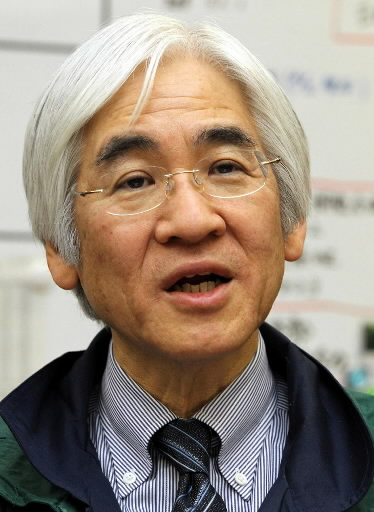Support and Ties in Face of Great Eastern Japan Earthquake: Interview with advisor for Fukushima Prefecture on radiation concerns
Apr. 6, 2011
by Masaya Yamauchi, Deputy Editorial Writer
Due to the lingering crisis involving the Fukushima No. 1 nuclear power plant, a situation with no resolution yet in sight, Fukushima Prefecture is faced with the prospect of continuing contamination from the release of radioactive materials. Kenji Kamiya, 60, was recently appointed advisor for the prefecture on radiation health risk management and a specially appointed professor at Fukushima Medical University. The Chugoku Shimbun spoke to Dr. Kamiya about current concerns.
What is your impression of the situation at present?
The level of radiation in the air is gradually decreasing. After their initial shock, the people in the prefecture seem to be regaining their composure. On the other hand, the issue of long-term exposure to low doses of radiation is now emerging.
What are people's expectations of you as an advisor?
With the new school year starting, I fully understand how worried parents are about their children’s well-being. Children are highly susceptible to radiation. I would like to advise people at schools and other locations about managing children's health risks. Starting next week, I hope to offer seminars to principals and teachers so they will have accurate information about radiation. I would also like to visit various places in the prefecture to give first-hand advice to parents and children.
What role will you play at Fukushima Medical University?
The prefectural university is the hub for studying the health effects of the nuclear accident and for providing medical support. The university doesn't have enough experts on radiation, so I would like to collaborate with Nagasaki University and other organizations to lend them support. I would also like to establish a base for Hiroshima University there, where some staff members from Hiroshima University can be located on a full-time basis.
You have been appointed policy advisor for the Cabinet Secretariat.
My role is to offer opinions as a medical expert on relevant issues. I'm taking turns with others to attend the secretariat meetings.
How do you view your mission?
By making use of my experience and expertise in the medical care of atomic bomb survivors, I will do everything in my power to serve the people who are suffering as a result of the crisis at the nuclear power plant. If the radiation leakage lingers on, people will suffer from chronic fear. Psychological care is also extremely important.
(Originally published on April 5, 2011)
Due to the lingering crisis involving the Fukushima No. 1 nuclear power plant, a situation with no resolution yet in sight, Fukushima Prefecture is faced with the prospect of continuing contamination from the release of radioactive materials. Kenji Kamiya, 60, was recently appointed advisor for the prefecture on radiation health risk management and a specially appointed professor at Fukushima Medical University. The Chugoku Shimbun spoke to Dr. Kamiya about current concerns.
What is your impression of the situation at present?
The level of radiation in the air is gradually decreasing. After their initial shock, the people in the prefecture seem to be regaining their composure. On the other hand, the issue of long-term exposure to low doses of radiation is now emerging.
What are people's expectations of you as an advisor?
With the new school year starting, I fully understand how worried parents are about their children’s well-being. Children are highly susceptible to radiation. I would like to advise people at schools and other locations about managing children's health risks. Starting next week, I hope to offer seminars to principals and teachers so they will have accurate information about radiation. I would also like to visit various places in the prefecture to give first-hand advice to parents and children.
What role will you play at Fukushima Medical University?
The prefectural university is the hub for studying the health effects of the nuclear accident and for providing medical support. The university doesn't have enough experts on radiation, so I would like to collaborate with Nagasaki University and other organizations to lend them support. I would also like to establish a base for Hiroshima University there, where some staff members from Hiroshima University can be located on a full-time basis.
You have been appointed policy advisor for the Cabinet Secretariat.
My role is to offer opinions as a medical expert on relevant issues. I'm taking turns with others to attend the secretariat meetings.
How do you view your mission?
By making use of my experience and expertise in the medical care of atomic bomb survivors, I will do everything in my power to serve the people who are suffering as a result of the crisis at the nuclear power plant. If the radiation leakage lingers on, people will suffer from chronic fear. Psychological care is also extremely important.
(Originally published on April 5, 2011)








